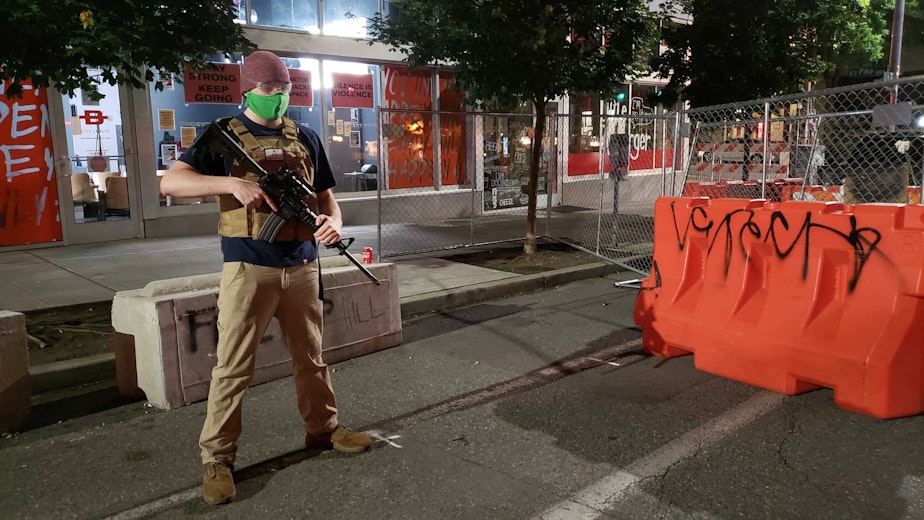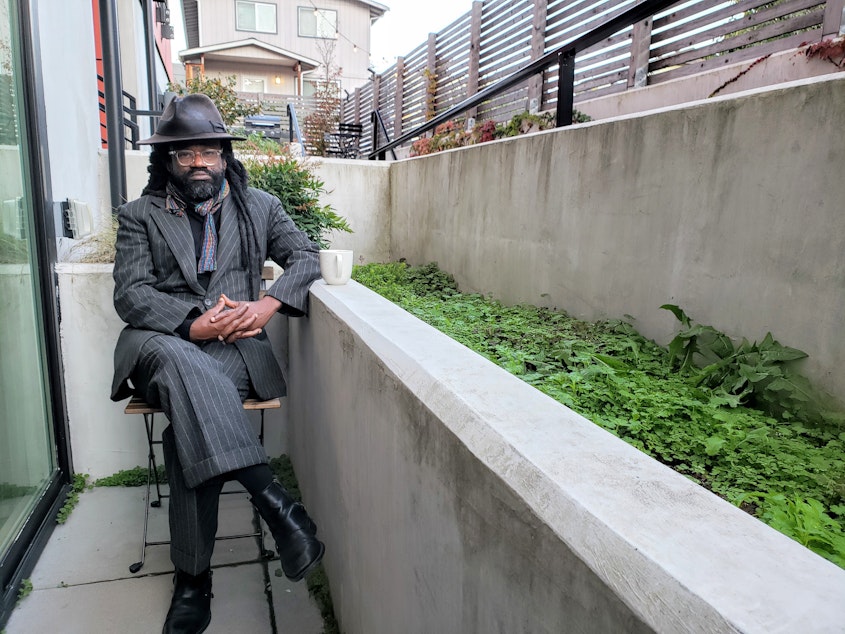Preaching peace, but preparing for unrest: Left and right leaders share same fears

Heading into to an Election Day fraught with anxiety and uncertainty, voices on Washington state's political left and right say they don’t want to see violence – regardless of the election’s outcome.
Their political divide is seemingly vast. But leaders touting titles of "antifa" and "Conservative" each use similar words when discussing the 2020 election: "Fear," "scared," "worry." And while they have attempted to spread a message of nonviolence as the election plays out, they still worry about violence from the fringe.
The Bishop of Antifa
Reverend Osagyefo Sekou has been a constant presence at Black Lives Matter demonstrations for years. He went to Ferguson, Mo. in 2014 during the protests that followed the police killing of Michael Brown. Sekou stood shoulder-to-shoulder with other clergy in Charlottesville, Va. three years later when white nationalists held a large rally in the city.
He’s dubbed himself the Bishop of Antifa.
Sekou said he encourages people to stand up to racists and fascists. He wants to see masses of people marching in the streets – but stops short of encouraging violent clashes.
Sponsored
“I pray there are not shootouts,” Sekou said outside of his Columbia City apartment. “I pray that they stand down.”
His biggest concern, Sekou said, is that people won’t trust the outcome of the election and will feel compelled to react violently. He calls this a “dangerous moment” for the country.
“The worst case scenario is that we have Charlottesville happening at the same time, all over the country following the election -- that’s what my fear is,” he said.

In response, Sekou has been holding "militant non-violent civil disobedience and de-escalation" over the last few months. His goal is teach protesters how to stand their ground and have their voices heard, without ending in brawls or shootings. If protests start violently, he says, they can only get worse and the original message is lost.
Sponsored
The problem with heavily-armed groups facing off in the streets, he says, is “if you gotta take it by force, you gotta keep it by force.”
Three Percent
Matt Marshall echoes that same message, but from the other side of the political divide.
Marshall is founder and leader of the Washington Three Percent, a right-wing group that holds gun rights rallies and teaches people how to arm themselves. He says his, and the group’s, role is to not engage in violence following the election, but instead, “to stay home, sit on the couch, and watch the results.”
“The organization already knows to stay home,” Marshall said. "This is not our fight.”
Sponsored
Washington Three Percent has held rallies before with members of Patriot Prayer, another far-right group. Some members of Patriot Prayer have been known for violent interactions in the streets with anti-fascists and other activists on the left.
Marshall says he’s told his group to do the opposite over the next few tense weeks.
“It’s a little bit scary,” he says. "That’s what really has me personally scared, is that people will be fighting whether their side wins or loses.”
He says he has faith in the electoral process and discourages talk of a rigged election.
“We have to respect the outcomes of our elections, and need make sure all parties involved are willing to accept a peaceful transition of power,” he said.
Sponsored

Fear, worry, and security
What worries both Marshall and Reverend Sekou is not so much organized groups starting violence, but individuals acting recklessly.
Sekou says he understands why people might want to show up to a rally or protest with a gun for personal protection, but feels there’s no good way to ensure that person knows how to handle firearms safely.
RELATED: Gun sales continue to surge across the Seattle-area
Sponsored
“It worries me, yes,” Sekou says. "Because probably most of them don’t know what they’re doing with them.”
Marshall has a related concern.
“My concern … we saw these twelve guys in Michigan who were a newly formed group of guys who were idiots, to say the least, who thought it was a good idea to go arrest their governor,” Marshall says.
Earlier this month a paramilitary group in Michigan was busted by the FBI for plotting to kidnap Democratic Governor Gretchen Whitmer. Allegedly they were upset with how Whitmer had responded to the Covid-19 pandemic in the state.
“I’m hoping that all these vigilante lunatics are as dumb as those guys were and are caught before something bad happens,” Marshall said.
As for law enforcement quelling individual violence, the FBI says it has been preparing for this election for months.
“We’re not blind to the fact of the polarization of both sides of the aisle this year with the election,” says Steve Bernd, a spokesperson with the FBI Seattle Division.
“Every election to the FBI is considered a national security event,” Bernd says. “This year, of course, nobody can deny that it’s different than other years.”
Bernd says the bureau is not “specifically monitoring any groups," ahead of the election. "What the FBI is attuned to, is potential federal violations, criminal activity, not ideology-based protests," he says.
The FBI in Seattle, Bernd says, has been working closely with local law enforcement and the Washington Secretary of State’s office to ensure the local election goes smoothly and without any voter fraud, suppression, or intimidation.
Washington, after all, has been successfully voting by mail and at drop boxes for years, so Bernd says they “have nothing to suggest that there’s gonna be something that people should be worried about at this time, but we’re prepared to deal with it should something arise.”
Matt Marshall and Reverend Sekou continue to push their messages of peace out to their respective groups, but acknowledge that there are simply too many individuals with a lot of emotion this election – and not everyone can be reached.
“Somebody’s gonna respond armed,” Sekou says. "That’s the political reality.”




